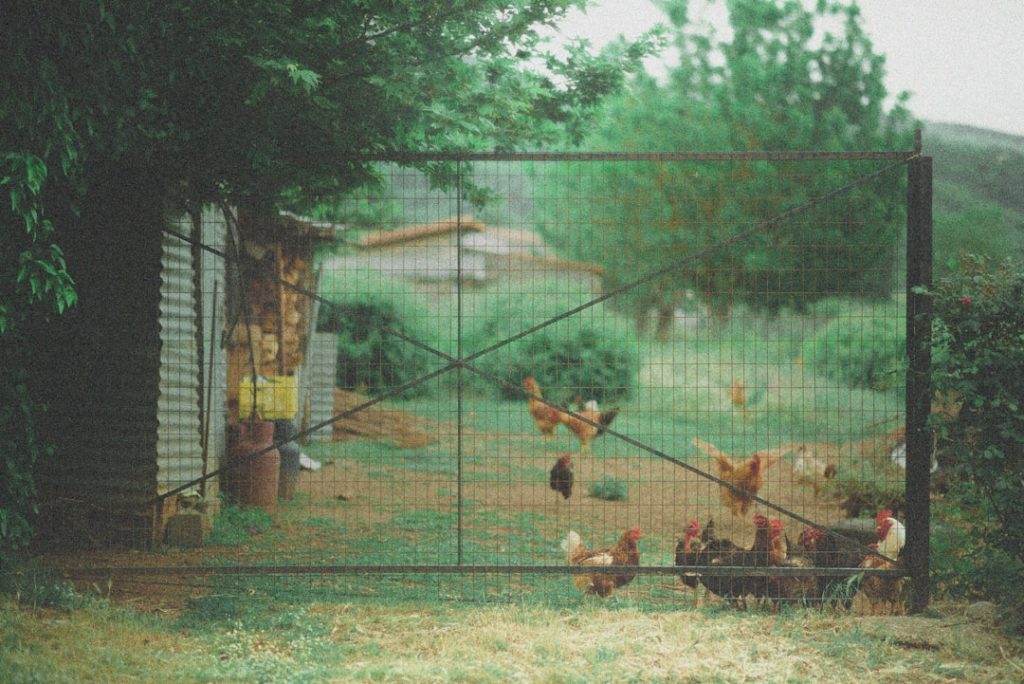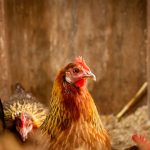Raccoons are known for their intelligence and adaptability when seeking food sources, including chickens. These nocturnal mammals are skilled climbers, capable of scaling fences and walls to access chicken coops. Once inside, raccoons can cause significant damage to the flock, often killing multiple birds.
Their problem-solving abilities enable them to identify and exploit weaknesses in coop security measures. Raccoons possess dexterous paws and sharp teeth, allowing them to manipulate latches, locks, and even damage wire mesh. The presence of raccoons near chicken coops can have negative effects beyond physical harm to the birds.
Chickens may experience stress and anxiety due to the proximity of predators, potentially leading to decreased egg production and overall health issues. Furthermore, raccoons can be carriers of diseases such as rabies and distemper, which pose risks to both chickens and humans. Raccoons’ combination of intelligence, climbing ability, and physical attributes makes them a significant threat to chicken coops.
Their persistence and adaptability present ongoing challenges for chicken keepers. Understanding these risks is crucial for implementing effective protective measures to ensure the safety and well-being of domestic chicken flocks.
Table of Contents
- 1 Securing the Coop: Tips for Raccoon-Proofing Your Chicken Enclosure
- 2 Nighttime Protection: Implementing Safe Practices for Keeping Chickens at Night
- 3 Deterrents and Repellents: Natural and Humane Ways to Keep Raccoons Away
- 4 Monitoring and Surveillance: Using Technology to Keep an Eye on Chicken Coops
- 5 Community Involvement: Working with Neighbors to Keep Raccoons at Bay
- 6 Emergency Response: What to Do If You Suspect Raccoon Activity in Your Chicken Coop
- 7 FAQs
- 7.1 What are the main threats raccoons pose to chickens?
- 7.2 How can I protect my chickens from raccoons?
- 7.3 Are there any specific measures I can take to deter raccoons from my chicken coop?
- 7.4 What should I do if I suspect raccoons are targeting my chickens?
- 7.5 Are there any natural predators of raccoons that can help protect my chickens?
Key Takeaways
- Raccoons pose a significant threat to chicken coops, as they are skilled predators and can easily access and harm chickens.
- Securing the coop with strong, predator-proof materials and locking mechanisms is essential to keeping raccoons out.
- Implementing safe nighttime practices, such as locking chickens in a secure coop and using motion-activated lights, can help protect them from raccoon attacks.
- Natural deterrents like predator urine and motion-activated sprinklers can help keep raccoons away from chicken coops without causing harm to the animals.
- Using technology such as security cameras and motion sensors can help monitor and protect chicken coops from raccoon intrusion.
Securing the Coop: Tips for Raccoon-Proofing Your Chicken Enclosure
Sturdy Construction and Reinforced Entry Points
First and foremost, ensure that your coop is constructed from sturdy materials that are difficult for raccoons to break or chew through. Heavy-duty wire mesh with small openings is an effective deterrent, as it can prevent raccoons from reaching through and grabbing chickens. Additionally, reinforce all doors, windows, and vents with secure latches and locks to prevent raccoons from gaining entry.
Securing the Perimeter
Another important step in raccoon-proofing your chicken enclosure is to secure the perimeter of the coop. This can be achieved by burying wire mesh several inches into the ground around the perimeter of the coop to prevent raccoons from digging underneath. Additionally, consider installing an electric fence or a motion-activated sprinkler system around the coop to deter raccoons from approaching.
Removing Attractants and Additional Measures
Finally, remove any potential food sources from around the coop, such as fallen fruit or unsecured garbage cans, as these can attract raccoons and increase the likelihood of an attack. By using sturdy materials, reinforcing doors and windows, securing the perimeter, and removing potential food sources, you can significantly reduce the risk of raccoon attacks on your chickens.
Nighttime Protection: Implementing Safe Practices for Keeping Chickens at Night

Nighttime is when raccoons are most active, making it a critical time to implement safe practices for keeping chickens secure. One of the most important steps you can take is to ensure that all chickens are safely inside the coop before nightfall. Raccoons are opportunistic predators and will take advantage of any opportunity to attack chickens that are outside of the coop at night.
By establishing a routine of closing the coop at dusk and conducting regular checks to ensure all chickens are accounted for, you can minimize the risk of nighttime predation. In addition to securing the coop at night, it is important to provide adequate lighting around the perimeter of the coop to deter raccoons from approaching. Motion-activated lights or solar-powered lanterns can help to discourage raccoons from getting too close to the coop.
Another effective measure is to install predator-proof hardware cloth over windows and vents to prevent raccoons from gaining entry while still allowing for ventilation. By implementing these safe practices for keeping chickens at night, you can significantly reduce the risk of raccoon attacks on your flock. Implementing safe practices for keeping chickens secure at night is essential for protecting them from raccoon predation.
By ensuring all chickens are safely inside the coop at night, providing adequate lighting around the perimeter, and installing predator-proof hardware cloth, you can create a secure nighttime environment for your flock.
Deterrents and Repellents: Natural and Humane Ways to Keep Raccoons Away
There are several natural and humane deterrents and repellents that can be used to keep raccoons away from chicken coops. One effective method is to use strong-smelling substances such as ammonia or vinegar around the perimeter of the coop. Raccoons have a keen sense of smell and are deterred by strong odors, making these substances an effective way to discourage them from approaching.
Additionally, planting strong-smelling herbs such as mint or lavender around the coop can help to repel raccoons. Another natural deterrent is the use of predator urine or feces around the perimeter of the coop. Raccoons are wary of potential predators and will avoid areas where they detect the presence of other animals.
Predator urine or feces can be purchased from garden supply stores and applied around the coop to create a natural barrier against raccoons. Additionally, consider installing motion-activated sprinklers or noise-making devices around the coop to startle raccoons and discourage them from approaching. Using natural and humane deterrents and repellents is an effective way to keep raccoons away from chicken coops without causing harm to the animals.
By using strong-smelling substances, predator urine or feces, and motion-activated devices, you can create a natural barrier against raccoons and protect your flock from harm.
Monitoring and Surveillance: Using Technology to Keep an Eye on Chicken Coops
Technology can be a valuable tool for monitoring and surveilling chicken coops to keep an eye on potential raccoon activity. One effective method is to install motion-activated cameras around the perimeter of the coop to capture any nighttime visitors. These cameras can provide valuable insight into the behavior of raccoons around the coop and help identify any potential weaknesses in security measures.
Additionally, consider using infrared cameras for nighttime surveillance, as these can capture clear images even in low-light conditions. Another useful technology for monitoring chicken coops is the use of wireless alarms or sensors that can alert you to any potential breaches in security. These devices can be placed on doors, windows, or vents and will sound an alarm if they detect any unauthorized entry.
By using technology to keep an eye on chicken coops, you can stay informed about potential raccoon activity and take proactive measures to protect your flock. Using technology such as motion-activated cameras, infrared cameras, wireless alarms, and sensors is an effective way to monitor and surveil chicken coops for potential raccoon activity. By staying informed about any nighttime visitors, you can take proactive measures to protect your flock from harm.
Community Involvement: Working with Neighbors to Keep Raccoons at Bay

United Front Against Raccoons
Working together with neighbors is a valuable asset in keeping raccoons at bay and protecting chicken coops from predation. By sharing information about potential threats and implementing consistent security measures across multiple properties, you can create a united front against raccoons. Communicating with neighbors about raccoon activity and sharing tips for securing chicken coops can help create a network of support that benefits all involved.
Education and Waste Management
Educating neighbors about the importance of proper waste management is crucial in reducing attractants for raccoons. By encouraging neighbors to secure garbage cans, remove fallen fruit, and eliminate other potential food sources, you can help reduce the likelihood of raccoon attacks on chicken coops in the area. Organizing community events or workshops focused on raccoon awareness and prevention can foster a sense of shared responsibility for protecting local flocks.
Benefits of Community Involvement
Working with neighbors to keep raccoons at bay is an effective way to create a united front against potential threats and protect chicken coops from predation. By sharing information about raccoon activity, implementing consistent security measures, and educating neighbors about waste management, you can create a network of support that benefits the entire community.
Emergency Response: What to Do If You Suspect Raccoon Activity in Your Chicken Coop
In the event that you suspect raccoon activity in your chicken coop, it is important to take immediate action to protect your flock from harm. One of the first steps you should take is to conduct a thorough inspection of the coop to identify any potential points of entry or weaknesses in security measures. Look for signs of damage such as broken latches or chewed wire mesh, as these may indicate that raccoons have gained access to the coop.
If you suspect that raccoons have been targeting your chickens, it is important to reinforce security measures immediately by repairing any damage and fortifying weak points in the coop’s defenses. Additionally, consider setting live traps baited with food such as cat food or marshmallows near the coop to capture any offending raccoons. Once captured, contact local wildlife authorities or pest control professionals for assistance in safely removing and relocating the raccoons.
In the event of suspected raccoon activity in your chicken coop, it is important to take immediate action to protect your flock from harm by conducting a thorough inspection of the coop, reinforcing security measures, and seeking assistance from wildlife authorities or pest control professionals if necessary. In conclusion, protecting chicken coops from raccoon predation requires a multi-faceted approach that includes understanding the threat posed by raccoons, securing the coop with effective measures, implementing safe practices for nighttime protection, using natural deterrents and repellents, monitoring with technology, working with neighbors for community involvement, and taking immediate action in emergency situations. By taking proactive steps to protect chicken coops from raccoon attacks, you can ensure the safety and well-being of your flock while fostering a sense of shared responsibility within your community.
If you’re looking for tips on how to keep your chickens safe from raccoons, you might also be interested in this article on where to put your chicken coop. Proper placement of your coop can help minimize the risk of raccoon attacks and keep your chickens safe and secure.
FAQs
What are the main threats raccoons pose to chickens?
Raccoons are known to be skilled predators and can pose a threat to chickens by attacking and killing them. They are also known to steal eggs and can cause damage to chicken coops in their attempts to access the birds.
How can I protect my chickens from raccoons?
To protect chickens from raccoons, it is important to secure the chicken coop with strong and sturdy materials. This includes using hardware cloth instead of chicken wire, securing all openings, and ensuring that the coop is well-maintained and free from any potential entry points for raccoons.
Are there any specific measures I can take to deter raccoons from my chicken coop?
There are several measures that can be taken to deter raccoons from accessing a chicken coop. This includes installing motion-activated lights or sprinkler systems, using strong-smelling deterrents such as ammonia-soaked rags, and keeping the area around the coop free from any potential food sources for raccoons.
What should I do if I suspect raccoons are targeting my chickens?
If you suspect that raccoons are targeting your chickens, it is important to take immediate action to secure the coop and protect the birds. This may involve reinforcing the coop, setting live traps to capture the raccoons, and contacting local wildlife authorities for assistance.
Are there any natural predators of raccoons that can help protect my chickens?
Some natural predators of raccoons, such as coyotes and large birds of prey, may help to keep raccoon populations in check. However, it is important to consider the potential risks and legal implications of introducing predators to the area around a chicken coop.
Meet Walter, the feathered-friend fanatic of Florida! Nestled in the sunshine state, Walter struts through life with his feathered companions, clucking his way to happiness. With a coop that’s fancier than a five-star hotel, he’s the Don Juan of the chicken world. When he’s not teaching his hens to do the cha-cha, you’ll find him in a heated debate with his prized rooster, Sir Clucks-a-Lot. Walter’s poultry passion is no yolk; he’s the sunny-side-up guy you never knew you needed in your flock of friends!







